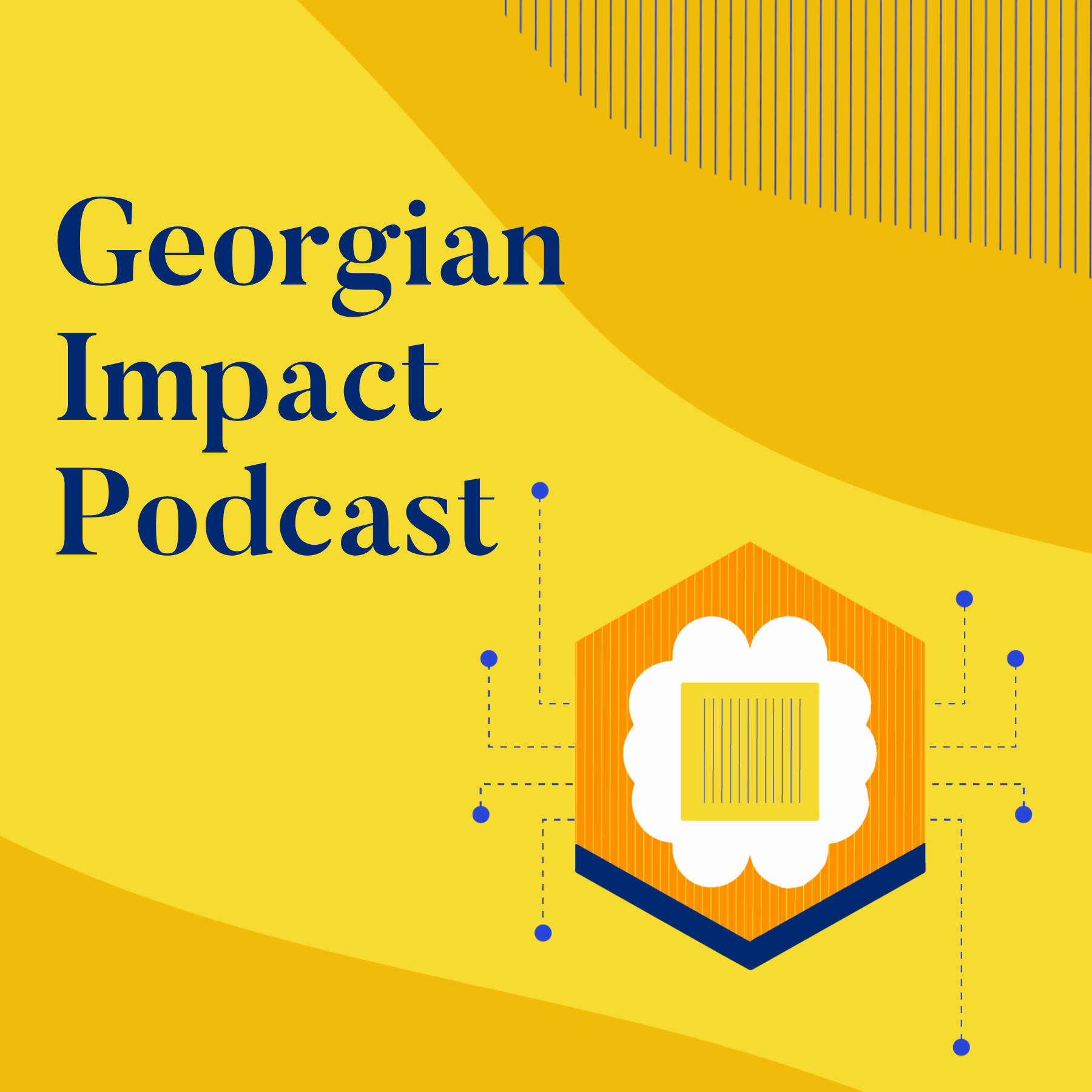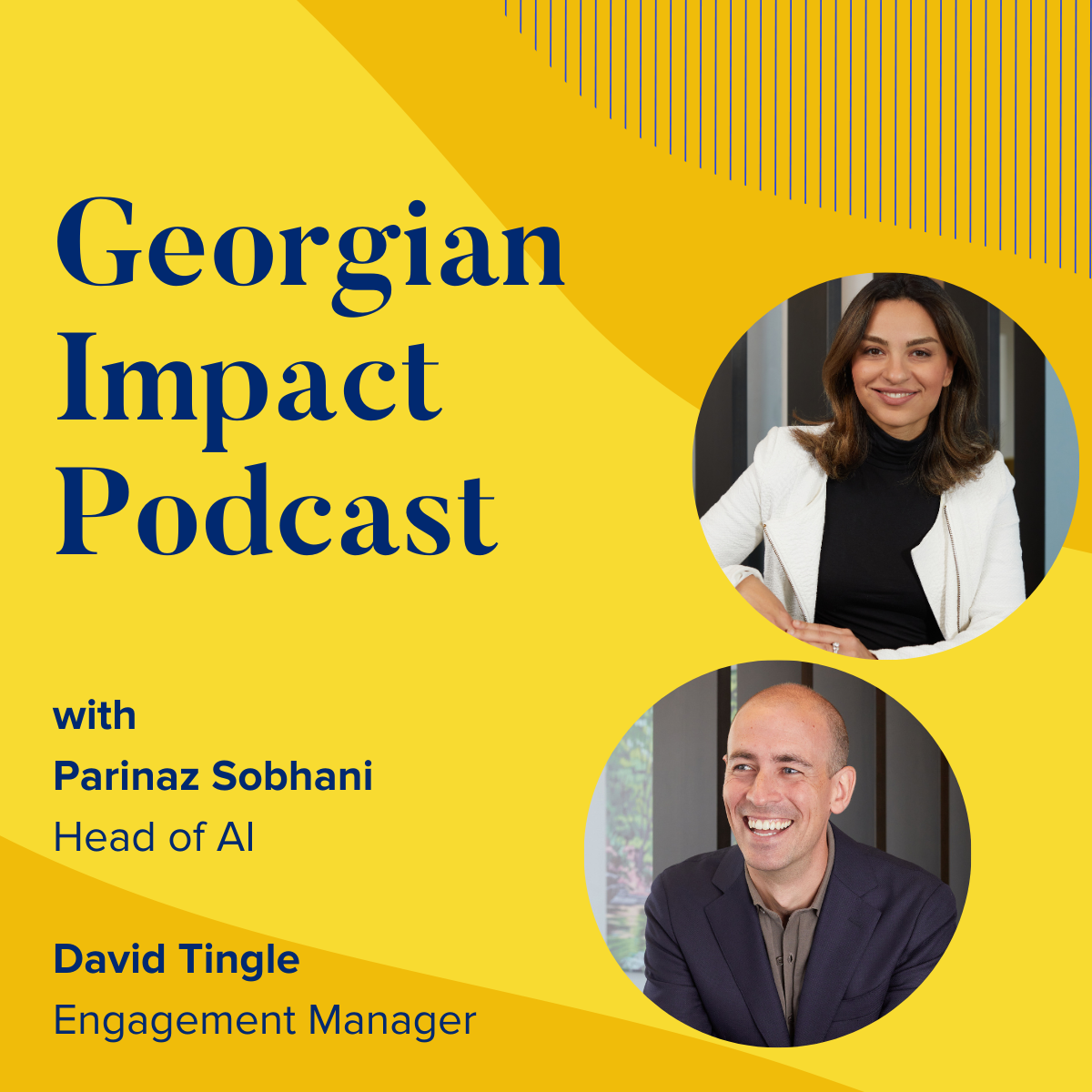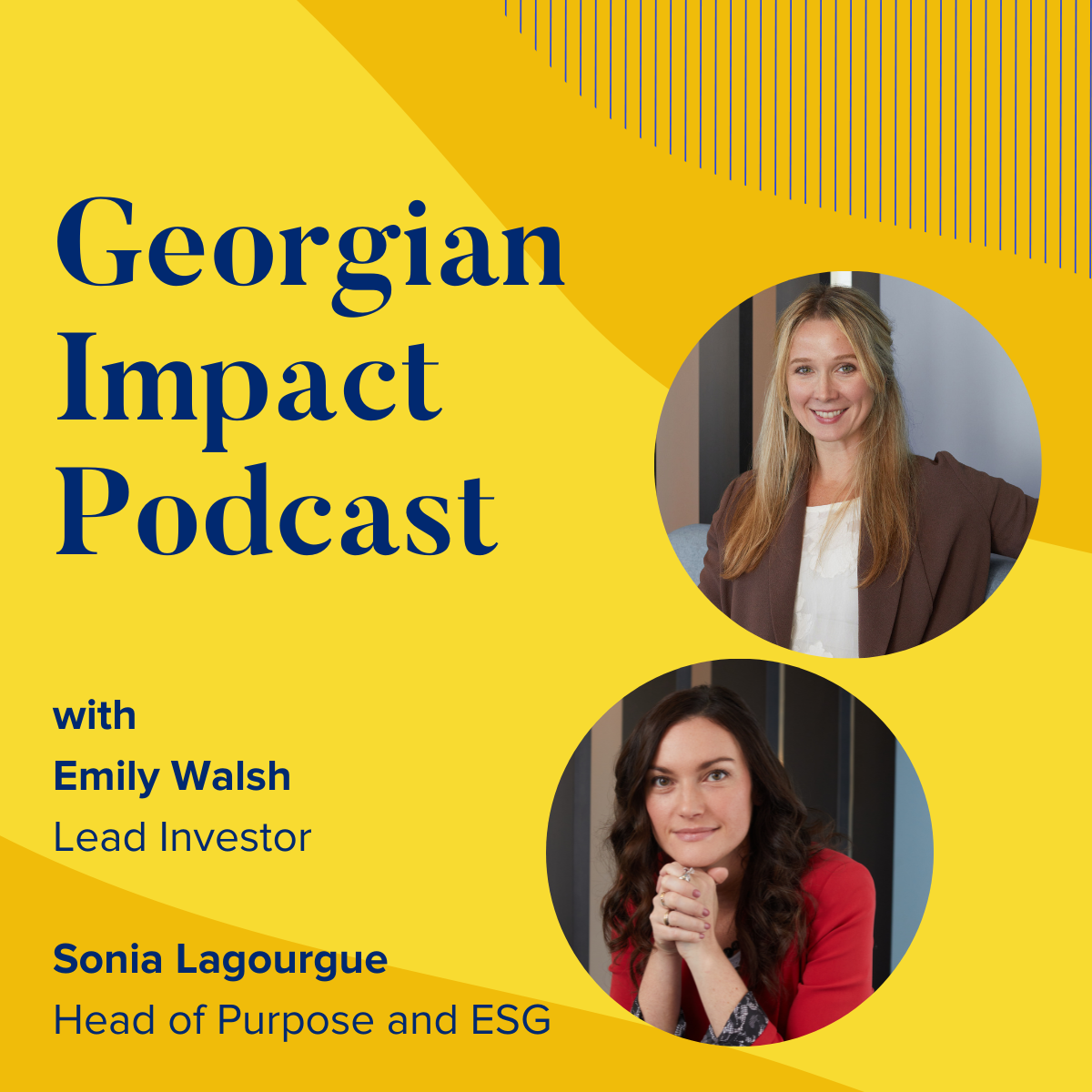Episode 86: Building Conversational AI Teams with Jason Brenier
- 0.5
- 1
- 1.25
- 1.5
- 1.75
- 2
Give me the Georgia them back podcast will try to bring you interesting and informative conversations with leading business and Technical experts experts come from businesses large and small all over the world. And sometimes those experts are right from inside. Our own organization is one of the latter cases. I'm delighted to welcome Jason brand you're back on the show. Jason's our vice president of strategy and a recognized expert in conversation. He spent the last six months traveling all over North America talking to companies that are adopting conversational AI company faces is building an effective conversational AIT. So with that in mind will be talkin about the trends Jason seeing and how companies can go for the theoretical to the Practical by building in the successful conversation AI teams. I'm John Prine, welcome to the impact podcast.
Jason Brady or I hear you've been traveling a lot having lots of conversation is is it all about conversational AI? Absolutely I have been on the road quite a bit and I do think it's all about conversation how many cities have been in lately a lot? John default to customer support? I believe there's so much more out there. What's your sense about this Market in the maturity of this Market? Absolutely. I think customer support continues to be a huge area of opportunity and they're still there's always going to be simple repetitive predictable tasks that kind of lend themselves to automation via chat bot or conversational interface, but I'm really excited actually to see a lot of other applications a new set of problems. Actually that are being solved through these interfaces. That's cool in my mind and
I said you mentioned you and I were talking the other day. I was thinking about some of the personal assistants stuff and I was thinking something along the line of X that AI but I think you're going to be on that right kind of a version of a a chatbot or conversational interface. It has a lot more context about you. The user is I think there's a huge opportunity there and seeing some really great examples of companies that are are building a much more personable, you know much more sophisticated set of of experiences through through that Channel showing in financial services. For example, there is a lot of personal financial assistance. Now, they go beyond just giving you your summarizing your bill or telling you about your balance in your savings account actually helping you develop a strategy for saving and setting different personal financial goals has a much more sophisticated to ask then then I think historically
Teapots of them. So basically it was this trigger response type thing is evolving. It is sounds like it if you just Financial app is helping me save it knows a lot about me. It's clearly being more personalized. It's clearly establishing even a relationship with me is is that one of them is that you're one of the key trends here, I think so. Yeah has a much more holistic view of who you are as a customer tries to anticipate what your needs might be proactively make, you know, recommendations and do that all with the proper context and we've heard obviously, we're not going to go into Alexa and Google home and all the hands-free voice stuff. But don't we have to do more now with languages were beginning to talk to these spots, you know, historically basically talked about chatbots and a text-based channel.
For these types of experiences and now I think just over the last year we've seen a huge explosion of skills and actions that are available via the voice Channel That's of course language-based as well. But there are things like intonation and prosody and emotion that comes through in the voice channel that don't necessarily come through easily on the text channel. So those are important considerations as well. As you try to build these experiences. They are interesting. So we have a next-generation kind of mixed wavy to of all of these interactions inbox and automation tools to as you talk to these companies. Obviously, you're sitting in a meeting with CEOs and Sons in c-suite Executives, and it's obviously a very strategic decisions with me a little bit. What are the business drivers all throughout my first question. Is it is it
You are retention. For example. What do you see as the business elements that are out there? I think there's definitely a couple that you can really move the needle on a number of different metrics by using conversation in building conversational experiences. I seen a lot of examples of companies that just want to grow their user base, right and really expand their footprint in the in the market off on their end of earlier stage. And so they're focused more on different channels the different customer segments that they can, you know, reach the playing there in a bot or their conversational experience on a specific platform. And so that's something that really is tied to, you know, gross and revenue really capturing a large part of a of a market, but then I also see some companies typically in later stages at our building much more sophisticated experiences with
Users in the main driver there is engagement and you know LTV from a business perspective creating some stickiness of those customers. So they keep coming back Institute, the the company can continue to offer more value in different ways to individual customers. That's a great setup. And I really hadn't thought about the you might be do some different early-stage versus latest age of more mature companies really want to talk about today is to help these companies overcome this they're going to have to hire and bills of jeans and so tell me a little bit about this new white paper that that you guys are just published. So one of the things that we have reserved and all these conversations that we've had West early-stage startups in later stage startup send large corporate entities are thinking about conversation. It's how do I build the team to deliver the product I think
The conversation is less about me know whether a company should deliver Services through the conversational Channel but more how are they going to get started? And how are they going to build the internal capabilities to bring the product forward? It's a big challenge because demand is high for conversational AI talents and resources are really really difficult to to find because it's such a new industry. It's a very G skill set. A lot of folks. Just don't even know. How do you sample. Timur with that team might look like how that team might have evolved over time as the product of olives. And so we spent a lot of time doing some research and talking to a lot of conversational AI teams and decided to write this book as kind of a Playbook or a guide for companies that are just getting into this chest.
Tell me a couple of years ago our most popular piece of content was around building a data science team. So this does sound like a very Natural Evolution companies looking for it show all share the title. This is gold getting started with conversation AI how to build a successful at our show notes as I went through the paper. My big is observation was this thing is I mean, this is so cross. I'm sure maybe more so than usual and even at a technical level, you've got people reporting to the head of product you got her people reporting to the data science organization. You got course engineering people and even customer Xs and success and other elements of the marketing tell me more about how you can pull this off and yeah, it was a cross-functional piece of this is really important because I kind of think of it as you know, you're kind of building a team to build a brain and there's men
Different aspects to that from you know design and determining what the bot is actually going to stay two analyzing what the bot or the speech based interface actually hears back or observes from from the user building intelligence overtime within that experienced. And so there's just a ton of different roles that are quite different from each other that need to come together and there's no kind of out of the box model for that at the moment. Will the hiring matter with his team structure matter based on these different types of use cases that you talked about earlier, I believe. Yes. Absolutely. We talked about the you know, those two stages earlier on and I think in order to build for example a conversation with experience for a large number of users that gets shared quickly and
Can reach specific customer segments that's a very different type of Team then if you're building say personal financial assistant or a virtual assistant can do much more complex tasks. So in the first case you are going to be focused on the different channels and platforms and Integrations that are needed and you probably have a smaller intent inventory that you need to be able to meet a recognized then in different things that that your users are going to want to do it going to probably simplify that to some extent in the latter example, you might need machine learning expert or computational linguist on the team to build out a much richer set of intense. You might need to do some things like sentiment analysis. You may need to do entity tracking across the conversation and and things like that. It could be a much different set of skills that need be represented on the team and as a result
The difference in a we going to cross over and bring more non-technical social scientists psychology behavioral folks to these teams that will not always be the case. I think that's going to be an increasingly important set of skills that I need to be represented on on the team. If you think about you know, building a compelling experience that you want to come back to hear what it might take to design a conversation that you want to you know, repeat or continue. That's more than just a nose back in engineering Mets, you know, really thinking about who the customer is who the audience is, you know why they're engaging with you in the first place what they want to get out of the conversation, you know, understanding and of the Linguistics of that conversation and the Dynamics between the different, you know, conversational participants make those are all relatively new new.
Skills for software development teams, and it's interesting because you're going I don't think we should use the word transactional but giving away from this request response to these long-running we could call them transactions but a bit these long-running transactions are we becoming long-running relationships? So now the data science different types of data that will absolutely have some influence on these social sciences that this relationship so to speak that's all right, I'll capture all the data but then make sense of it. Mine it analyze it and then with those insights improves the conversation or the next conversation you're going to have with you to that same customer or a new customer. Those are all really important skills to have represented in the team.
Pryor podcast I just want to go just a little bit in terms of hoosier the ultimate responsible for the building of trust, whether it's recovering from a failed conversation or recognizing somebody's angry versus not angry, the overarching goal or is still the overarching goal the business result of getting revenue and I do think it's really important to think about the conversational interface and how it will help your company build a better relationship with your users a longer-term of going to trust in a relationship with with your users in again, that's that's not something that your typical software engineer as a lot of experience doing it. There's there's a lot of kind of softer skills and involved in that and you know, we've discussed this before
I want folks, you know humans to get into that conversational mode reveal a lot of information that they may not reveal otherwise and they share a lot more than then they would in other channels are other situation then so we have a responsibility to protect that information to you don't understand that they've shared it. It's in the first place and they're really think long and hard and strategically about how we respond to that how we use that information. I think all of that stuff is even more important in the conversational domain then perhaps in another types of interfaces. So I'm going to set you up for what we're going to kind of get to which is kind of this discussion of job descriptions. So and I'll set you up by saying there are clearly than other competencies that maybe we haven't thought about in terms of at 8 to use the word intuition, but it's conversational Intuition or or it's shakiba personas.
Thinking strategically so talk to me about competencies and how you turn that into a key element of this paper that are emerging here or at least the requirement for new skills at least emerging and and so it's actually quite challenging I think to find individuals with with some of those skills or they'd have had Direct experience, you know building a bot historically or you know, building a peach-faced interface historically some of that Talent does exist mean we chose built the ivr in call center solutions for probably a couple of decades now and said that there are folks with a no background conversational design and have an understanding Linguistics have an understanding of how you know, conversation works and how to create a compelling conversation with users.
But I think more and more we're going to have to just because of the demand for that type of talent. We're going to look Beyond traditional software companies were some of these people have been working and think about things like, you know movie script writers and you know psychologists and just look look Beyond where you normally would look for our building a soccer team. So the ultimate blending of these hard skills and I hate to use the word soft skills cuz it's so important but I get that so what's in the back so if I'm a CEO or maybe you had a product going to build a product that I want to start building might seem it's not easy to find these people. What are you doing to make it easier for me? Yeah. So we talked about a couple different places where you can find the talent or acquire the talent there is see no Academia. That's a place to consider Racine a lot of success in finding researchers in some of these areas.
Soak City have yo investigated in a different language related issues and publish research that may or may not already have start-up experience or the experience Building Products. So that's that's an area that we recommend, you know looking to but then along with that comes a responsibility is going to educating those team members as to your internal processes so that they can work closely with and you know, say the engineering team or the data science team then so there has to be Earnest around around that and in what is going to take to really help them become part of closing it functional team. You can also look for a talent. Like I said turn on traditional places scriptwriters Etc, but then often we we saw a lot of examples of
Internal in a team members that were maybe doing kind of Integrations or working on the back end part of the system that we're really interested in conversation. I really had had some experience, you know doing an NLP project or something like that and really wanted to have the opportunity to work on the conversational interface and have the opportunity to expand their their skill sets. And so that's probably one of the most common things at that. We seen one of the most common ways to to grow a team or at least an initial team in particular when you're right about the experimental stage and building your first version of of a conversational experience. And so that's that's an important one to get consider as well.
And then I also there's the possibility depending on the stage of the company, of course of acquiring a team. There are there many different, you know, chatbot Outfitter thousands of Chad Potts out there and their their Builders is who have built them and not all those chatbots have been hugely successful products are usually successful agreed we talk about that as well as an opportunity interesting and I think about this and I always as in my old days of programming Yulia program some testers and I liked it seems like the people that are the best casters that really understand how to challenge and drive this maybe some of the future designers of these Solutions my book. Those are the folks it have worked.
What's closely with conversational data right in they're going to have some some insight into you know, how conversation have a successful conversation should be designed what can go wrong. And I think one of the challenges with building these types of systems is anticipating what can go wrong and recovering from the difference failures that can take place in with users. And I'm so yeah, I think I think someone like that would be well positioned to your take on some of the other tasks that are required for rebuilding me experience What About Soul of the last question then motivation how to keep the team together how to keep them motivated. What do you think it takes to keep the team really, really important question because of the kind of cross-functional nature of the team because of the fact that I think everyone's expectations that
Team members expectations to be slightly different because this is relatively new Endeavor everywhere. It's important to have a strategy around that and understand what a different team members value in the in the work that they're doing and they were going to say she in that that they're at it gets really dangerous to assume. And in this case, what we've observed is a desire for some level of autonomy. I think that is linked to the nature of the work that's going on here is very creative very Innovative. There's a lot of kind of design but at the same time it's also you know analytical I think most of the roles that we outlined in the in the book have some degree of experimentation or Discovery involve. So I think protecting that autonomy in allowing the team members to experiment and Shadeland and a broom
Hypotheses and kind of iterate that's that's a really important component making professional development available to the team members again. There may be snow folks coming in from a completely different industry that have never built a bot before never worked in a software company before so, you know kind of upskilling and allowing books to learn more and more about you know, what this product is and who the customers are in and how the software development process works more. Generally. I think it is important and frankly. I think a lot of the team members will inspire each other and they want to learn, you know more about what the other team members know and I'm so making making available to them the opportunity to know take a Linguistics class or you know, take an intro to data science class or a design class, right?
Call those things making those opportunities available to the team in can be really important. It's a different world has new stuff coming down the pike conversational eyes getting hot. So Jason brand new. Thanks for taking the time to chat with us. I'm looking forward to getting feedback from lots of folks who are looking at this ebook and learning how to build a successful conversation AI team does interface with the new market that's emerging here. So it's going to be it's going to be quite an interesting rise, or thanks for being with us today. Thanks a lot, John.
Thanks for listening if you like what we doing, we appreciate your telling other people about the show better yet. Give us a 5-star rating on iTunes or write a review doing so a really help ensure the more people can find us and if you haven't already please subscribe to the impact podcast on iTunes, SoundCloud or have you go to find your podcast.








